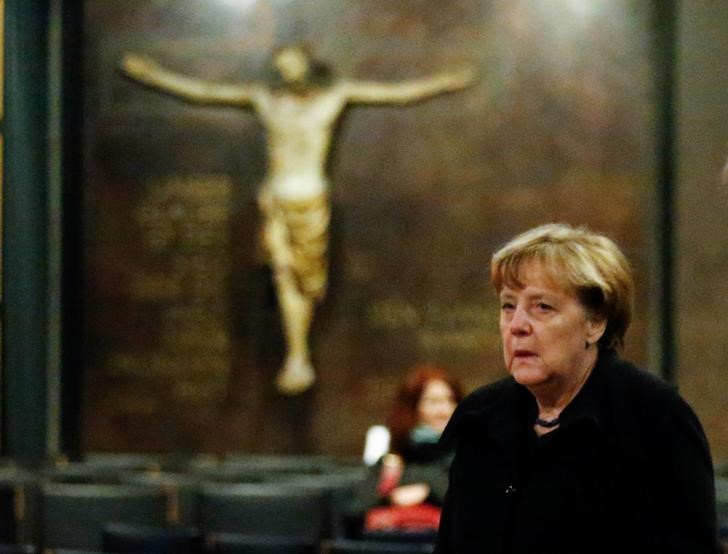By Noah Barkin
BERLIN (Reuters) - For months, Germany's Angela Merkel has looked like the one safe bet in European politics.
As Britain's David Cameron, Italy's Matteo Renzi and France's Francois Hollande all succumbed to the scorn of angry voters, the German chancellor promised to fight for a fourth term and seemed destined to win it.
That is still the base case scenario as Germany gears up for an election in the autumn of next year, one of several in Europe that could tilt the region's political landscape.
But the truck attack on a crowded Christmas market in the bustling heart of the former West Berlin on Monday night is a reminder that even Merkel, Europe's longest-serving leader, is vulnerable to events on the ground as 2017 unfolds.
Initial reports suggested the attack, which killed 12 people and injured 48, was carried out by a 23-year-old migrant from Pakistan who arrived in Germany one year ago, with the flood of refugees that Merkel welcomed with her optimistic mantra "we can do this". Later, police said it was unclear whether the man they had arrested on Monday night was indeed the driver.
What does seem clear however, is that any attack in Germany with a link, no matter how tenuous, to last year's refugee influx will be laid at Merkel's door by opponents keen to destabilise the one mainstream leader in Europe who has looked invulnerable.
"The attack will re-ignite criticism of Angela Merkel, her liberal refugee policy and commitment to open borders, demonstrating how vulnerable she is heading into next year's election,' said Mujtaba Rahman of Eurasia Group.
In her first comments since the attack, Merkel, 62, urged Germans not to succumb to fear and said the country would find the strength to continue to live "free, together and open".
But she also hinted at the troublesome implications of the incident for her and others who have opened their arms to refugees fleeing war and persecution in the Middle East.
"I know it would be especially hard for us all to bear if it were confirmed that the person who committed this act was someone who sought protection and asylum in Germany," she said.
POPULISTS POUNCE
The right-wing Alternative for Germany (AfD) party, which was created three years ago in opposition to euro zone bailouts but has since morphed into an anti-immigration party, was quick to put the blame on Merkel and her policies.
"The environment in which such acts can spread was carelessly and systematically imported over the past one-and-a-half years," said AfD leader Frauke Petry. "It was not an isolated incident and it won't be the last."
Foreign critics also took their digs, with Nigel Farage, a driving force behind the Brexit vote in June which forced out Cameron, tweeting: "Terrible news from Berlin but no surprise. Events like these will be the Merkel legacy."
A poll released on Tuesday morning and conducted before the attack showed support for Merkel's conservative bloc - her Christian Democratic Union (CDU) and its Bavarian allies - at 36 percent, 14 points ahead of the next strongest party, the Social Democrats (SPD), and 25 points ahead of the AfD.
The survey for Stern magazine also showed that 50 percent of Germans would back Merkel in a hypothetical vote for chancellor, compared to just 14 percent for SPD leader Sigmar Gabriel.
Despite that healthy margin, Merkel herself has said next year's election will be "tough like no other".
Her advisers have also cautioned against viewing her re-election as a done deal, pointing to the threat of attacks, a renewed influx of refugees and the risk that Russia could try to destabilise Merkel with fake news and cyber leaks as it appears to have done in the run-up to the recent U.S. election.
"Nothing is certain," one top aide told Reuters last month. "There is a lot of time until the election and a lot can happen between now and then."
Merkel has watched over the past half year as Cameron and Renzi staked their political futures on referendums that they lost. Hollande, deeply unpopular, announced this month he would not stand for a second term next year. In 2017, the Netherlands, France, Germany and probably Italy will hold elections.
CSU STANDOFF
One of the biggest concerns in Merkel's entourage has been the criticism of her refugee policies from the Bavarian Christian Social Union (CSU), which has threatened to break with her CDU unless she accepts a ceiling on the number of migrants allowed into the country each year.
Merkel has refused to budge on that demand but has tried to appease the CSU with a series of real and symbolic steps to clamp down on migration and ratchet up security. This month, she backed a ban on face-covering Muslim veils for women.
Despite the olive branches and a sharp drop in the number of arrivals over the course of this year - official data suggests the 2016 figure will be roughly a third of the 2015 total - CSU leader Horst Seehofer has kept up the pressure.
On Tuesday, in the aftermath of the Christmas market attack, he pressed Merkel once again.
"We owe it to the victims, their loved ones and all German people to rethink and overhaul our migration and security policies," Seehofer said.
A bigger problem would be if Merkel's own party turned on her. But after re-electing her as CDU leader earlier this month with a score of nearly 90 percent, that seems far-fetched, even if grumbling from low-ranking officials was evident on Tuesday.

With mainstream, centrist parties enjoying the support of roughly 75 percent of the electorate and Merkel's CDU with a healthy lead over all challengers, it may take more disasters like the one on Monday evening at a Christmas market in Berlin to knock the German leader from her perch.